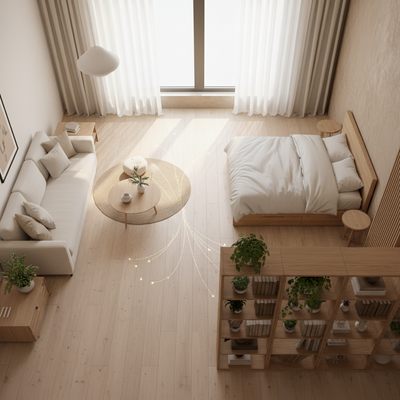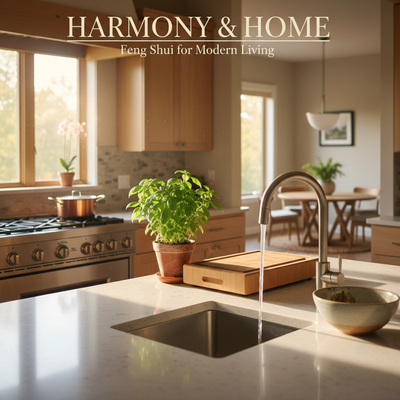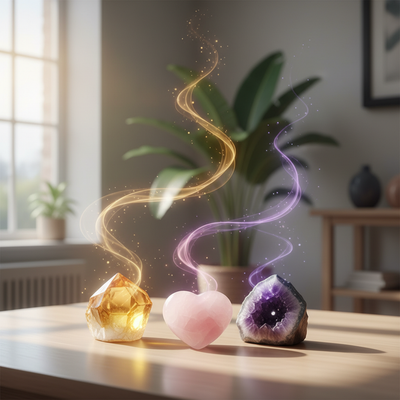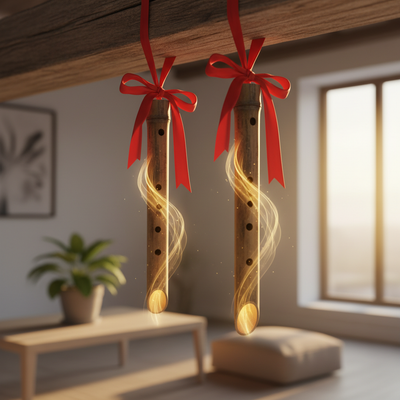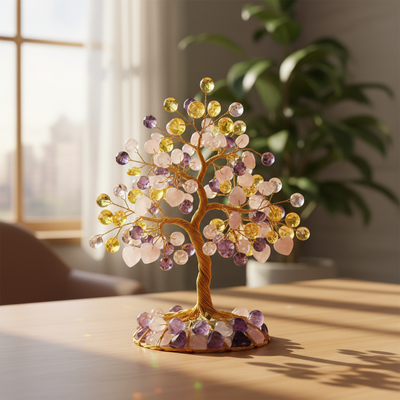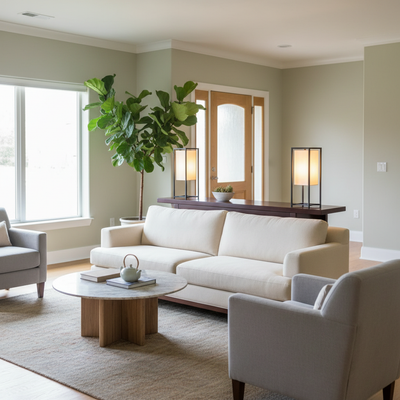A bedroom without windows can feel like a big problem. If you live in a space like this, you might feel uneasy, tired, or trapped without knowing why. In feng shui, this feeling makes sense. A room without windows is cut off from natural light and energy flow, creating what we call stuck energy. This isn't just an idea - it can really affect your mood, sleep, and how you feel overall.
But this problem can be solved. Think of your room like a garden that doesn't get enough sun. With the right tools and knowledge, you can create a bright, healthy space. This guide will give you real solutions to change your room. We will look at how to create fake natural light, improve air flow, and use special decorating tricks to bring back balance, turning a difficult room into a peaceful place to rest.
The Main Feng Shui Problem

To use these fixes well, you need to understand why a bedroom without windows messes up your home's energy balance. This isn't about superstition - it's about the basic rules of energy, light, and how they affect how we feel. When you understand these main ideas, you'll be able to use solutions with more purpose and success.
Stuck Energy: The Main Problem
In feng shui, windows are like the "eyes" of the home. They are the main doorways where energy enters, moves around, and refreshes a space. Think of energy like a fresh, flowing river. Windows let this river flow through your home, bringing life and nourishment. When a room is sealed off, that part of the river becomes a still pond. The energy becomes stale, heavy, and lifeless. This "dead" energy can show up in your life in several ways:
- Feeling "stuck" in your job or personal life
- Always feeling low energy and tired
- Poor sleep that doesn't make you feel rested
- A general lack of inspiration and motivation
- Trouble starting new projects
Unbalanced Energy
At its core, feng shui is about creating harmony. A main rule of this practice is balancing two types of energy called Yin and Yang. Yang energy is active, bright, big, and connected with daylight and activity. Yin energy is passive, dark, quiet, and connected with nighttime and rest. A bedroom naturally needs more Yin energy to help you sleep, but it must be balanced with Yang to feel refreshing.
A bedroom without windows feng shui has too much Yin energy. It lacks the daily boost of Yang energy from the sun. This imbalance can lead to feelings of tiredness, sadness, wanting to be alone, and even depression. The goal of our feng shui fixes is to purposely add Yang energy to fight the too-much Yin and bring back a healthy, life-giving balance.
Cut Off from Nature
Humans are naturally connected to the cycles of day and night. Our body clocks, which control sleep, hormones, and other body functions, are controlled by our exposure to natural light. A room without windows cuts this important connection. Waking up in total darkness and spending time in a room with no natural light can confuse the body, leading to poor sleep, daytime sleepiness, and feeling less alive. Feng shui recognizes this link, seeing the disconnection from nature as a main source of imbalance.
The Complete Feng Shui Toolkit
Now that we understand the "why," let's focus on the "how." This toolkit gives you seven powerful and practical fixes to fight the negative effects of a bedroom without windows feng shui. These are not just decorating tips - they are purposeful actions designed to shift your space's energy from stuck to lively.
1. Light Up and Energize
Lighting is your number one tool for replacing natural sunlight. The goal is to copy the sun's full range of light and create a changing, layered lighting plan. A single, harsh overhead light only makes the room feel more like a cold, closed-in box.
Instead, use multiple light sources to create background, task, and accent lighting. Put your main lights on a dimmer switch to adjust the brightness throughout the day. A smart timer can be a game-changer, programmed to slowly brighten the lights in the morning to copy a sunrise and dim them in the evening to prepare your body for rest.
- Full-spectrum LED bulbs (5000K-6500K) for ceiling lights and lamps provide clean, bright light that closely copies natural daylight.
- Up-lighting, from floor lamps placed in corners, visually "lifts" the ceiling and the room's energy, preventing it from feeling heavy.
- Himalayan salt lamps offer a soft, warm, and gentle glow, perfect for creating a calming Yin atmosphere in the evening.
2. Create Air Flow
If energy cannot enter through a window, you must get it moving with machines. Stale air equals stale energy. The simple act of moving air around can have a big effect on how a room feels.
Buy a high-quality, quiet air cleaner. Not only will it remove dust and allergens, but it also keeps the air, and thus the energy, in constant, gentle motion. A quiet moving fan can do something similar. The subtle sound and feeling of moving air help to break up stuck energy. Most importantly, make it a daily habit to keep the bedroom door open for at least a few hours. This allows the energy from the rest of your home to flow in and the stale energy to flow out.
3. The Magic of Mirrors
Mirrors are a powerful feng shui tool, often called the "aspirin" of the practice. In a room without windows, they do two important things: they bounce and increase existing light, and they create an illusion of depth, making the space feel larger and less confining.
However, mirror placement in a bedroom is critical. A hard and fast rule in feng shui is to never place a mirror directly facing the bed. The active energy of a mirror can disrupt your own energy field while you sleep, leading to restlessness and trouble sleeping. It is also believed that a mirror reflecting the bed can invite the energy of a third party into a couple's relationship. The best placement is on the wall where a window might naturally be, ideally positioned to reflect a beautiful piece of art or the light coming from the doorway.
4. Using Color Power
Color is a form of light and energy, and your choice of paint can dramatically change the feel of a room without windows. Avoid dark, heavy, or overly bright colors, which absorb light and will make the space feel even more like a cave.
Choose a palette of light, airy, and expansive colors that reflect light and promote a sense of openness. These colors introduce Yang energy and create a brighter, more active environment.
- Whites & Off-Whites: Classic choices like soft linen, creamy vanilla, or pure white create a clean, reflective canvas.
- Light Pastels: A very pale sky blue or soft seafoam green can mentally bring up a sense of nature and sky.
- Earthy Tones: Warm, sandy beiges or a very light terracotta can make the room feel grounded and cozy without being dark.
5. Bring Nature Indoors
If you cannot see nature outside, bring it inside. Living plants are one of the most powerful feng shui fixes. They introduce the Wood element, which is all about growth, vitality, and life. Plants actively clean the air and their life force helps to fight stuck energy. Even in a room with no natural light, many species can grow well with the help of full-spectrum bulbs.
| Plant Name | Feng Shui Benefit | Care Level |
|---|---|---|
| Snake Plant (Sansevieria) | Strong protective energy, air purifying | Very Low |
| ZZ Plant (Zamioculcas) | Represents growth and good fortune | Very Low |
| Pothos (Epipremnum) | Excellent air purifier, vibrant life energy | Low |
Beyond plants, include other natural materials to enhance the connection to the earth. Choose furniture made of real wood, use fabrics like cotton, linen, and wool for bedding and curtains, and add decorative elements made of stone or crystal.
6. Artwork as a "Window"
Your mind is a powerful tool. You can create a "mental window" by hanging a large, compelling piece of artwork. Choose art that shows a scene you wish you could see from a real window. An expansive landscape with a deep view, a bright and sunny seascape, or a beautiful photo of a forest canopy can act as a focal point for positive energy. This "view" gives your eye and your mind a place to "go," creating a feeling of openness and connection to the outside world.
7. Activate with Five Elements
A balanced room is a harmonious room. Feng shui seeks to balance the five elements of nature: Wood, Fire, Earth, Metal, and Water. In a room without windows, which has too much Yin, purposely adding these elements creates a more dynamic and complete energy signature.
- Wood: Add living plants, wood furniture, or use the color green.
- Fire: This is your most important element here. Use lighting, candles (with extreme care and never unattended), and accents of red, orange, or purple.
- Earth: Include pottery, crystals, square shapes, and colors like sandy beige, yellow, or soft brown.
- Metal: Use metal picture frames or decor, round or oval shapes, and colors like white, gray, or metallics.
- Water: Introduce wavy patterns, uneven shapes, a mirror, and colors like blue or black. A small, quiet tabletop fountain can be excellent if the sound is soothing, but avoid it if you find it disruptive.
Case Study: Revitalizing a Client's Bedroom
Theory is one thing, but real-world use shows the true power of these principles. We want to share a story from our client files that shows how this multi-layered approach can create a big transformation.
The Client's Challenge
Our team, THE QI FLOW, was contacted by a client, "Sarah," a young professional renting an apartment in a busy city. Her only option for a bedroom was a small, interior room in the basement with no windows. She described it as her "dungeon," a place she dreaded entering. She reported feeling constantly tired, uninspired, and completely "stuck" in her career. The room was dark, the air was stuffy, and the overall feeling was one of heavy, oppressive energy.
The QI FLOW Team's Strategy
Our consultation with Sarah focused on a step-by-step revitalization based on the core principles we've discussed. We didn't just suggest one fix; we created a complete strategy.
-
First, we tackled the light. We had her replace the single, harsh overhead bulb with a layered system. A central ceiling fixture was fitted with a full-spectrum "daylight" bulb on a dimmer. We added two tall, slender floor lamps in the far corners, pointing their light upward to lift the space. For her nightstand, we recommended a Himalayan salt lamp for a soft, evening glow.
-
Next, we created a "view." On the largest, blankest wall, the one opposite the door, we had her hang an oversized, unframed canvas print of a sun-drenched beach scene with a long view to the horizon.
-
Then, we strategically placed a mirror. A full-length, slim-framed mirror was mounted on the wall next to the door. This placement was key: it captured and reflected the light from the hallway when the door was open and bounced the light from the new lamps around the room. Importantly, it did not reflect the bed.
-
Finally, we balanced the elements. We recommended painting the walls a soft, sandy beige (Earth Element). She added two large Snake Plants in beautiful ceramic pots (Wood Element). We advised crisp white linens (Metal Element), and a small piece of abstract art featuring deep blues (Water Element). The new lighting system provided the powerful and much-needed Fire Element.
The Vibrant Transformation

The change was immediate and dramatic. The room no longer felt like a box; it felt breathable, bright, and inviting. Sarah reported sleeping more deeply within the first week. She told us she started waking up feeling more energetic and optimistic. A few months later, she called to share that she had successfully pitched a major project at work and received a promotion, a move she attributed to the newfound clarity and positive mindset that started with changing her room's energy. This case study from THE QI FLOW's experience proves that with the right strategy, even the most challenging space can become a source of positive energy and support.
Advanced Feng Shui Techniques
Once you have the basics in place, you can elevate your room's energy even further with these more advanced techniques. These methods deepen the transformation, taking your space from simply "fixed" to truly exceptional.
The "Fake Window" Technique
This goes a step beyond simply hanging a picture. For a truly transformative effect, create a more convincing architectural illusion. Find a reclaimed, multi-pane window frame from an antique or salvage shop. Refinish it and mount it on the wall where a window would feel most natural. You can then place a mirror behind the panes to reflect light and create depth. For the ultimate illusion, install thin LED light strips around the inside of the frame, connected to a dimmer. This creates a soft glow that copies daylight shining through, tricking the brain on a subconscious level.
The Importance of Decluttering
In any room, clutter blocks the flow of energy. In a room without windows, this effect is ten times stronger. With no natural outlet for energy to escape, clutter traps and stagnates the energy, making the room feel heavy and suffocating. In this space, you must be ruthless. Every single object must have a purpose or be something you find truly beautiful. Follow a simple rule: if you don't use it or love it, it doesn't belong in your sanctuary. Maximize hidden storage, like containers under the bed, and keep all surfaces as clear as possible.
Engaging the Other Senses
Since you are missing the visual stimulus of a window, you can make up for it by heightening the room's other sensory experiences. This creates a rich, immersive environment that feels nurturing and alive.
- Sound: The gentle sound of a small, quiet tabletop fountain can introduce the energy of the Water element and its soothing sound can mask the oppressive silence. Alternatively, a white noise machine with high-quality nature sounds, like birdsong or gentle rain, can create an auditory connection to the outdoors.
- Scent: Aromatherapy is a powerful tool for shifting energy. Use an essential oil diffuser to fill the space with specific scents. During the day, use uplifting citrus oils like lemon or sweet orange to energize the room. In the evening, switch to calming scents like lavender or chamomile to signal to your body that it's time to rest.
Common Mistakes to Avoid
As you work to improve your space, be mindful of these common pitfalls that can accidentally cancel out your efforts and worsen the room's feng shui.
- Using Dark, Heavy Colors: Painting walls in dark shades like navy, charcoal, or forest green will absorb all the precious light you're adding and make the room feel smaller and more confining.
- Placing a Mirror Facing the Bed: This is the most critical mistake. It disrupts sleep, can cause nightmares, and is considered very bad feng shui for relationships.
- Relying on a Single Overhead Light: A lone, harsh light source creates shadows and a sterile, "interrogation room" feeling. Layering your light is non-negotiable.
- Allowing Clutter to Accumulate: Even a small amount of clutter in a room without windows can create a significant energetic blockage.
- Using Fake, Dusty Plants: While high-quality silk plants are a passable alternative, cheap, dusty plastic plants hold dead energy and are worse than having no plants at all.
- Keeping the Door Closed 24/7: This seals the room off completely, guaranteeing stuck energy. Allow for daily air and energy exchange with the rest of your home.
Your Bedroom, Your Sanctuary
A bedroom without windows presents a clear feng shui challenge, but it is by no means a curse. It is an opportunity to become more intentional and mindful about the energy of your personal space. By understanding the core problem of stuck energy, you can effectively apply the solutions.
Remember the three most vital cures: introduce layered and dynamic light, ensure the physical movement of air, and set a powerful intention with your decor choices. By using light, air, and intention as your guides, you can transform a difficult space. You can move it from a place of confinement to a true sanctuary that supports your health, nurtures your spirit, and provides deep, restorative rest.
